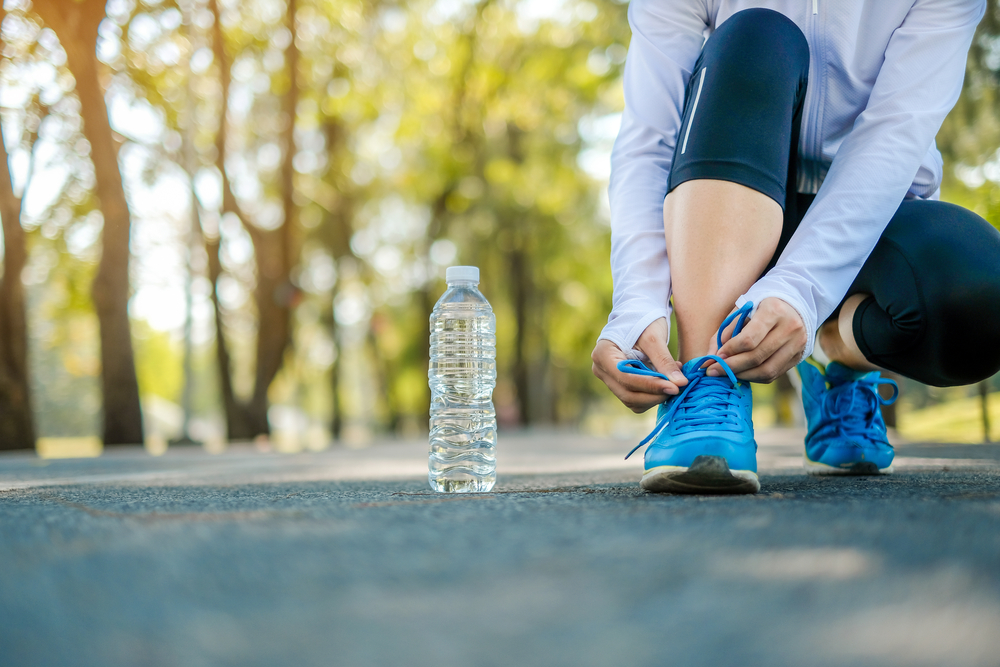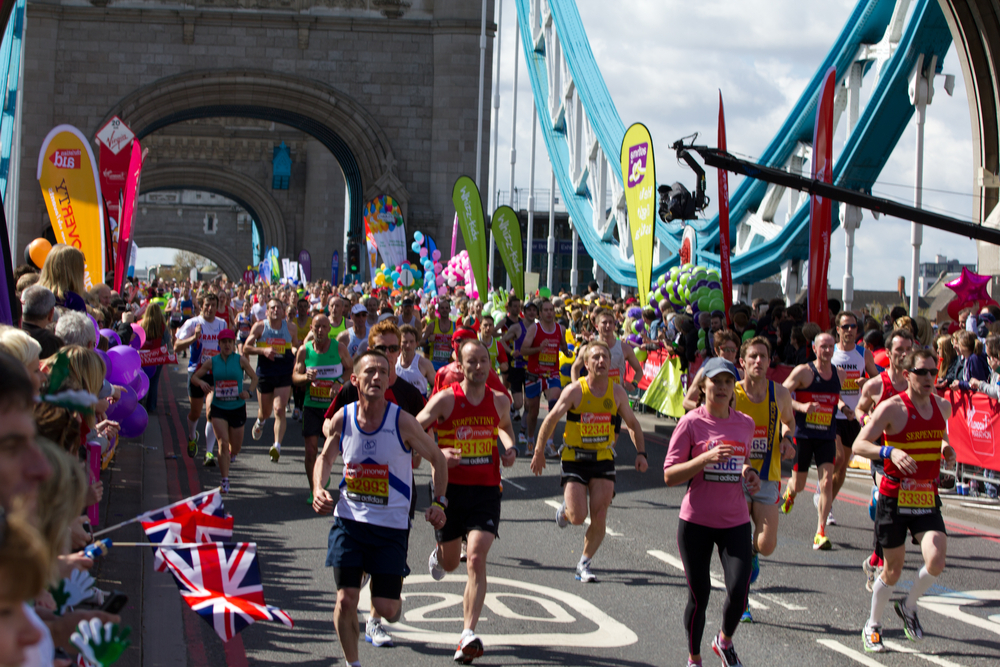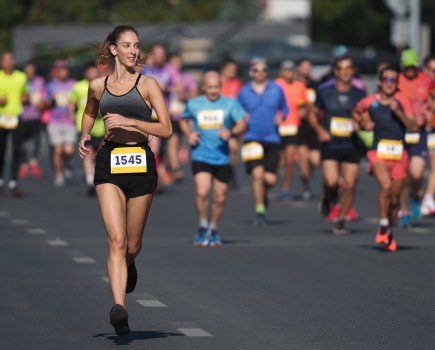After 889 days of waiting, the London Marathon is finally here! Are you running the marathon this year? We’ve rounded up some last-minute London Marathon tips to help make sure you’re in the best shape possible (physically and mentally!) for the big day…
By Lily Smith
Running in the London Marathon this Sunday? First of all: congratulations! Getting a place in the race is no easy feat, due to the huge number of entrants every year. With the event being cancelled last year, there were even more runners keen to snag a spot. So, even though the idea of the marathon might be daunting, remind yourself of what an amazing experience it will be, too!
As there’s only a few days to go before the big race, most of your training should be done and dusted by now. At this point, it’s more important to focus on letting your body rest and recover, to make sure you can perform at your best on the day. However, there are a few things you can do in these last few days to get yourself in the best shape possible for the London Marathon…
London Marathon tips: the days leading up to the race

Don’t wear a brand new pair of shoes – break them in first!
The last thing you want during a marathon is uncomfortable new shoes. 361° Europe ambassador Vicky Hogg recommends: ‘In the final stage of preparation for a marathon, always make sure to train in the trainers you’re going to run in for the big day. This helps to break the shoe in and molds it to the shape of your foot, which helps stop blistering and losing any toenails!’
When choosing your shoe, Vicky also recommends going half a size up: ‘That way if your feet swell there is still plenty of space!’
Build up your carbohydrate stores
In the last few days before a marathon, it’s essential that you’re fuelling yourself with the right foods. The team at Science in Sport, leaders in endurance sports nutrition, recommend: ‘In the few days leading into a marathon, you need to ensure you replenish your carbohydrate stores ahead of the challenge ahead.
‘Those long runs and high volume of training will probably have kept you incredibly hungry over the past few months. With your decreased running at present, you’ll naturally find that your body wants to eat enough to replenish its carb stores.
‘Focus on wholewheat or ‘brown’ carbs until a few days before the big day, and then switch over to easily digestible simple carbs such as white bread, pasta and rice. A great tip is to continuously sip on a carbohydrate sports drink, such as Beta Fuel from SiS, to ensure you’re getting the carbs in as well as hydrating.
‘It’s also wise to slightly lower your intake of protein, fats and fibre during race week. This will help you to accommodate for the increased carb intake and avoid any gastrointestinal distress on race day.’

Keep yourself hydrated
Running a marathon will make you sweat – a lot. This will cause you to lose a lot of water, which can lead to dehydration. Because of this, it’s so important to make sure you’re fully hydrated in the days leading up to the marathon, to ensure your body can function at its best before, during and after the race.
Keeping hydrated can also reduce our risk of chafing during the race. Rich Edmonds, co-founder of Runderwear, explains: ‘If you are dehydrated, your body is unable to flush salts away from your skin as easily. Drink lots of water before, during, and after the marathon, as this will allow you to perspire freely during the race, meaning the perspiration doesn’t dry into salt crystals that can enhance the chafing.’
Lower your training levels and rest!

Nat Voyle from VAHA
With the marathon just around the corner, the majority of your training is done. Now, it’s important to let your body rest and recover before the big race. Nat Voyle, a trainer from interactive fitness mirror VAHA, adds: ‘Try doing light to moderate strength work or a low impact strength class to keep those legs feeling strong, including movements such as glute bridges, bodyweight squats, light deadlifts and plank holds.
‘These exercises can help activate your glutes and lengthen your hamstrings which will help your overall running. A plank hold will keep your core engaged and get you used to controlling your core when running, allowing for good posture.’
Take time to stretch out your muscles
The last thing you want on race day is sore, tight muscles. You’ll have enough of that to come after the race! Before the race, take time to stretch your muscles to relieve tightness and tension.
Nat Voyle recommends: ‘Stretches such as pigeon pose, quad stretch, hamstring/calf stretch, lying leg extensions and figure four stretch, can really help to lengthen out your muscles.’

Invest in anti-chafe running kit
Chafing is never fun – especially not when you’re trying to run a marathon! Rich Edmonds explains: ‘Chafing is a friction-induced skin injury where the outer layer of skin (epidermis) is rubbed creating microscopic tears, exposing the skin layer below (dermis), which becomes red, raw and irritated.’ Ouch!
Protect your skin with the running gear from anti-chafe activewear brand, Runderwear. We recommend kitting yourself out with the Anti-blister Low Rise Socks, the Easy On Running Bra and the Hipster Brief.
Make sure your kit is ready in advance
No one likes a last-minute rush. On the morning of the race, you’ll want to feel calm, collected and organised – so getting all your kit ready in advance is essential.
When packing your bag, we recommend packing it in the order you’ll need things in. For example, your change of clothes for after the race should be at the bottom, while your bottles, energy gels and important documents should all be easily accessible at the top.
Don’t lose your friends and family on the day
There will be thousands of people present on the day of the London Marathon, making it tricky to meet up with others. Plus, if you’re not a local, London can feel like a bit of a maze!
Before the race, it’s a good idea to make plans with your friends and family, to make sure you know where to meet up after the race. We recommend downloading what3words, which will help you to give one another your exact location (rather than a vague ‘I’m by the big tree..!).
For supporters: it’s also a good idea to plan in advance where you are going to stand along the route, so you can be sure you don’t miss your friend or loved one as they run past. We recommend downloading the official London Marathon app, which has just been released. This app allows you to track whoever you’ve come to support, so you know where you need to be to cheer them on.

Get plenty of sleep
You’ll need all your energy for Sunday, so it’s important to get plenty of sleep over the next few nights. Nat Voyle adds: ‘Sleep is so important for recovery, so try and get a few days of 6-8 hours sleep a night, before the marathon.’
London Marathon tips: on the morning of the race
Eat an easily digestible breakfast and stay hydrated
Your tummy will probably be full of butterflies on race morning, so it’s best to eat something simple and easily digestible. Stick with something you usually eat before a run, rather than surprising your body with something new. This could lead to unwanted tummy troubles during the race.
The team at Science in Sport adds: ‘On race morning, continue to sip your carb drink in the few hours ahead of the start, to keep your hydration and energy levels stocked up.’
Allow yourself to get excited!
The London Marathon is one of the biggest races in the world – and you’re going to be running in it! Stop worrying about the little things now, and let yourself get excited.
Nat Voyle adds: ‘You’ve done all you can do, now it’s time to go out and try to enjoy every minute of it. London Marathon is like no other race in the world. It has a special atmosphere with thousands of people cheering you on every single part of the 26.2 mile course and this year more than ever before with its return the energy will be off the scale. Enjoy!’

London Marathon tips: during the race
Stay fuelled up with carbs
As your run gets underway, you’ll start to lose the energy stores you’ve built up before the race. The team at Science in Sport recommends: ‘Ensure you take on enough carbs during the race. Aim for between 40 and 60 grams of carbohydrate per hour during the marathon.
‘If possible look for gels with a high carb content, such as Science in Sports Beta Fuel which each contain 40g, to be gentle on your stomach!’
Let the crowd spur you on – and enjoy!
Running a marathon can take its toll, mentally as well as physically. It’s completely normal to start feeling slightly deflated as the race goes on and tiredness kicks in.
However, the London Marathon is guaranteed to have one of the best atmospheres out of all the running races in the world. The buzz from the crowd will be electric!
When you start to feel a little tired, and your mind is telling you that you can’t do it, take yourself out of your mind and into the real world, where thousands of people are cheering you on, every single step of the way. Let their excitement fuel you and keep you going until you cross the finish line!
We hope you enjoy the London Marathon!







